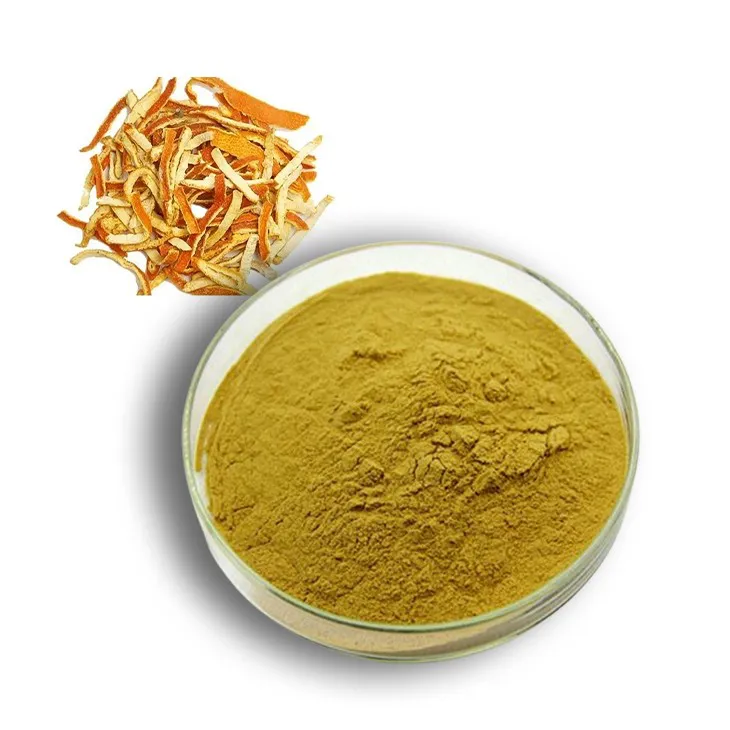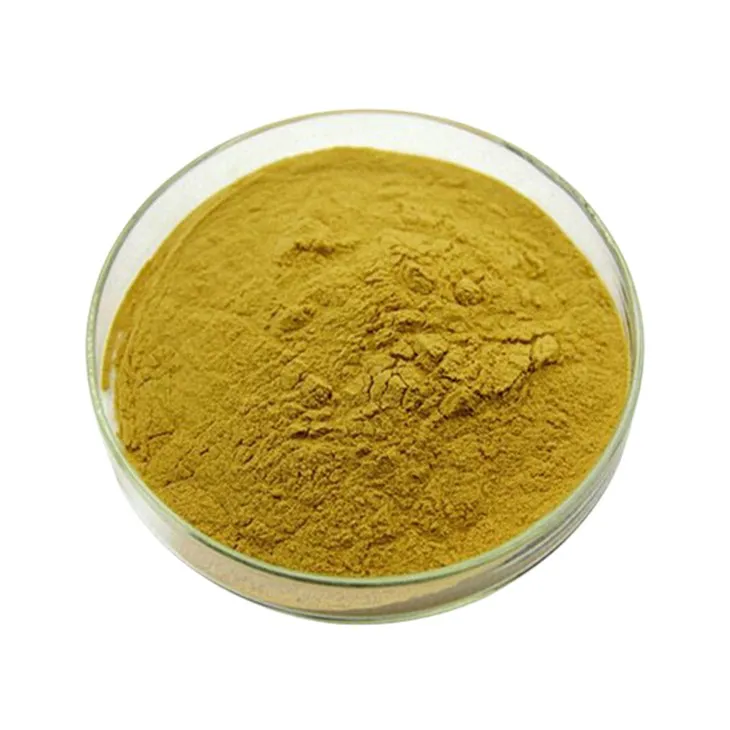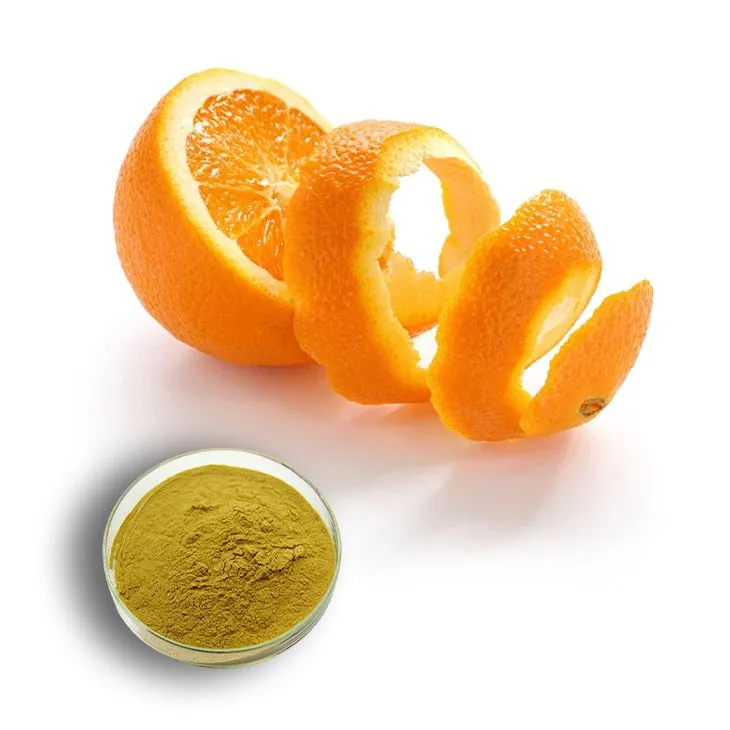- 0086-571-85302990
- sales@greenskybio.com
14 Major Health - care Efficacy of Hesperidin.
2024-11-13

1. Introduction to Hesperidin
Hesperidin, also known as orange peel glycoside, is a flavonoid that is widely found in citrus fruits such as oranges, lemons, and grapefruits. It has been the subject of extensive research due to its numerous potential health - care benefits. This compound is known for its bioactive properties, which play a significant role in maintaining human health.

2. Antioxidant Effects
Free Radicals and Oxidative Stress
Free radicals are highly reactive molecules that are produced during normal metabolic processes in the body. However, an excess of free radicals can lead to a state known as oxidative stress. Oxidative stress is associated with damage to cells, proteins, and DNA, and has been implicated in the development of various diseases, including cancer, cardiovascular diseases, and neurodegenerative disorders.
Hesperidin as an Antioxidant
Hesperidin has powerful antioxidant properties. It is able to scavenge free radicals in the body, thereby reducing oxidative stress - related damage. This antioxidant activity is due to the presence of phenolic hydroxyl groups in its chemical structure. These groups can donate electrons to free radicals, neutralizing them and preventing them from causing harm to the body's cells and tissues.

3. Anti - inflammatory Properties
The Role of Inflammation in Disease
Inflammation is a natural immune response that helps the body to fight off infections and repair damaged tissues. However, chronic inflammation can be harmful and is associated with many diseases, such as arthritis, diabetes, and heart disease. Inflammatory processes involve the activation of various immune cells and the release of inflammatory mediators, such as cytokines and prostaglandins.
Hesperidin's Anti - inflammatory Action
Hesperidin has been shown to possess anti - inflammatory capabilities. It can inhibit the production of inflammatory mediators, such as interleukin - 6 (IL - 6) and tumor necrosis factor - alpha (TNF - α). By reducing the levels of these cytokines, hesperidin helps to soothe inflammation in various tissues. Additionally, it can also modulate the activity of immune cells involved in the inflammatory response, such as macrophages.

4. Cardiovascular Health Benefits
Regulation of Blood Pressure
High blood pressure is a major risk factor for cardiovascular diseases. Hesperidin has been found to play a role in regulating blood pressure. It can relax blood vessels, which helps to lower blood pressure. This vasorelaxant effect may be due to its ability to stimulate the production of nitric oxide (NO). Nitric oxide is a signaling molecule that causes smooth muscle relaxation in blood vessels, leading to vasodilation.
Cholesterol - Lowering Effects
Elevated cholesterol levels, particularly high levels of low - density lipoprotein (LDL) cholesterol, are associated with an increased risk of heart disease. Hesperidin has been shown to have cholesterol - lowering effects. It can inhibit the absorption of cholesterol in the intestine and also promote the excretion of cholesterol from the body. This helps to maintain healthy cholesterol levels and reduces the risk of developing cardiovascular diseases.

5. Immune System Enhancement
The Immune System and Health
The immune system is a complex network of cells, tissues, and organs that defends the body against foreign invaders, such as bacteria, viruses, and parasites. A strong immune system is essential for maintaining good health. However, factors such as stress, poor diet, and lack of sleep can weaken the immune system.
Hesperidin's Impact on the Immune System
Hesperidin has potential benefits for the immune system. It can enhance the function of immune cells, such as lymphocytes and macrophages. For example, it can increase the production of antibodies by B - lymphocytes, which are important for fighting off infections. Additionally, hesperidin can also modulate the activity of cytokines, which play a key role in immune regulation.
6. Anti - cancer Potential
Cancer and the Role of Oxidative Stress and Inflammation
Cancer is a complex disease that is associated with multiple factors, including genetic mutations, oxidative stress, and chronic inflammation. Oxidative stress can cause DNA damage, which may lead to the development of cancer. Chronic inflammation can also create an environment that promotes the growth and spread of cancer cells.
Hesperidin's Anti - cancer Properties
Hesperidin's antioxidant and anti - inflammatory properties may contribute to its anti - cancer potential. By reducing oxidative stress and inflammation, it may help to prevent the initiation and progression of cancer. Additionally, hesperidin has been shown to have direct anti - cancer effects in some studies. For example, it can induce apoptosis (programmed cell death) in cancer cells and inhibit their proliferation.
7. Neuroprotective Effects
Neurodegenerative Diseases and Oxidative Stress
Neurodegenerative diseases, such as Alzheimer's disease and Parkinson's disease, are characterized by the progressive loss of neurons in the brain. Oxidative stress is thought to play a significant role in the pathogenesis of these diseases. Free radicals can damage neurons and disrupt normal brain function.
Hesperidin's Neuroprotective Action
Hesperidin's antioxidant properties make it a potential candidate for neuroprotection. It can protect neurons from oxidative stress - related damage. Additionally, hesperidin may also have other mechanisms of action in the brain, such as modulating neurotransmitter levels and reducing inflammation. These effects may help to slow down the progression of neurodegenerative diseases.
8. Anti - diabetic Effects
Diabetes and Insulin Resistance
Diabetes is a metabolic disorder characterized by high blood sugar levels. Insulin resistance is a key factor in the development of type 2 diabetes. In insulin - resistant individuals, cells in the body do not respond properly to insulin, which leads to elevated blood sugar levels.
Hesperidin's Role in Diabetes Management
Hesperidin has been shown to have anti - diabetic effects. It can improve insulin sensitivity, which helps to regulate blood sugar levels. Additionally, hesperidin can also reduce oxidative stress and inflammation in pancreatic beta - cells, which are responsible for producing insulin. By protecting these cells, hesperidin may help to maintain normal insulin production.
9. Anti - aging Properties
The Aging Process and Oxidative Stress
The aging process is associated with an increase in oxidative stress and a decline in the function of various organs and tissues. Free radicals can damage cells and accumulate over time, leading to the characteristic signs of aging, such as wrinkles, age spots, and a decline in cognitive function.
Hesperidin's Anti - aging Benefits
Hesperidin's antioxidant properties can help to combat the oxidative stress associated with aging. By reducing free radical damage, it may help to delay the onset of age - related changes. Additionally, hesperidin's anti - inflammatory properties may also contribute to its anti - aging effects. Chronic inflammation is also associated with the aging process, and by reducing inflammation, hesperidin may help to maintain healthy tissues and organs.
10. Skin Health Promotion
Skin and Oxidative Stress
The skin is constantly exposed to environmental factors, such as ultraviolet (UV) radiation, pollution, and toxins, which can generate free radicals and cause oxidative stress. Oxidative stress in the skin can lead to various skin problems, such as premature aging, wrinkles, and skin cancer.
Hesperidin's Benefits for Skin Health
Hesperidin can protect the skin from oxidative stress - related damage. It can be applied topically or taken orally to improve skin health. Topically, hesperidin can scavenge free radicals in the skin and reduce the appearance of wrinkles. Orally, it can promote the production of collagen, which is important for maintaining skin elasticity.
11. Bone Health Support
Bone Metabolism and the Role of Inflammation
Bone health is important for maintaining mobility and preventing fractures. Bone metabolism is a complex process that involves the balance between bone formation and bone resorption. Inflammation can disrupt this balance and lead to bone loss. For example, in diseases such as osteoporosis, there is an increase in bone resorption due to chronic inflammation.
Hesperidin's Contribution to Bone Health
Hesperidin's anti - inflammatory properties may help to maintain a healthy bone metabolism. By reducing inflammation, it can prevent excessive bone resorption. Additionally, hesperidin may also have other mechanisms of action in bone, such as promoting the differentiation of osteoblasts (cells responsible for bone formation). This can help to increase bone density and reduce the risk of fractures.
12. Liver Protection
The Liver and Oxidative Stress
The liver is a vital organ that is involved in many metabolic processes, including detoxification. However, the liver is also susceptible to damage from oxidative stress, which can be caused by factors such as alcohol consumption, drugs, and toxins. Oxidative stress in the liver can lead to liver diseases, such as fatty liver disease, hepatitis, and cirrhosis.
Hesperidin's Liver - protective Effects
Hesperidin can protect the liver from oxidative stress - related damage. It can scavenge free radicals in the liver and enhance the antioxidant defense system. Additionally, hesperidin can also modulate liver metabolism and reduce inflammation in the liver. These effects may help to prevent liver diseases and maintain liver health.
13. Digestive Health Improvement
The Digestive System and Inflammation
The digestive system is responsible for the digestion and absorption of nutrients. Inflammation in the digestive tract can lead to various digestive problems, such as gastritis, ulcerative colitis, and irritable bowel syndrome. Inflammatory processes in the digestive system can be triggered by factors such as diet, stress, and infections.
Hesperidin's Role in Digestive Health
Hesperidin's anti - inflammatory properties can help to soothe inflammation in the digestive tract. It can also improve the function of the digestive system by promoting the secretion of digestive enzymes and enhancing intestinal motility. Additionally, hesperidin may have prebiotic - like effects, which can promote the growth of beneficial gut bacteria.
14. Conclusion
Hesperidin is a bioactive compound with a wide range of potential health - care benefits. Its antioxidant, anti - inflammatory, and other properties make it a promising candidate for the prevention and treatment of various diseases. However, more research is needed to fully understand its mechanisms of action and to determine the optimal dosage and administration methods. Incorporating hesperidin - rich foods, such as citrus fruits, into the diet or taking hesperidin supplements may be a beneficial way to improve overall health.
FAQ:
Q1: How does hesperidin combat free radicals in the body?
Hesperidin has antioxidant effects. It can directly interact with free radicals and neutralize their unpaired electrons, thereby preventing them from causing oxidative damage to cells and tissues in the body.
Q2: In what ways does hesperidin show anti - inflammatory capabilities?
It can interfere with the inflammatory signaling pathways in cells. By inhibiting certain pro - inflammatory molecules and promoting the release of anti - inflammatory factors, hesperidin helps to soothe inflammation in various tissues.
Q3: How does hesperidin regulate blood pressure?
Hesperidin may act on the smooth muscle cells of blood vessels. It can relax these cells, which in turn helps to widen the blood vessels and reduce the resistance of blood flow, thus contributing to the regulation of blood pressure.
Q4: What is the mechanism by which hesperidin affects cholesterol levels?
Hesperidin might influence the metabolism of cholesterol in the body. It could interfere with the absorption of dietary cholesterol in the intestines and also promote the excretion of cholesterol from the body, thus helping to regulate cholesterol levels.
Q5: How does hesperidin enhance the body's defense mechanisms?
It can stimulate the activity of immune cells such as lymphocytes and macrophages. These immune cells play crucial roles in recognizing and eliminating foreign pathogens, so by enhancing their activity, hesperidin enhances the body's defense mechanisms.
Related literature
- Title: The Antioxidant and Anti - Inflammatory Properties of Hesperidin: A Review"
- Title: "Hesperidin and Cardiovascular Health: Current Evidence and Mechanisms"
- Title: "Role of Hesperidin in Immune System Modulation: New Insights"
- ▶ Hesperidin
- ▶ Citrus Bioflavonoids
- ▶ Plant Extract
- ▶ lycopene
- ▶ Diosmin
- ▶ Grape seed extract
- ▶ Sea buckthorn Juice Powder
- ▶ Fruit Juice Powder
- ▶ Hops Extract
- ▶ Artichoke Extract
- ▶ Mushroom extract
- ▶ Astaxanthin
- ▶ Green Tea Extract
- ▶ Curcumin
- ▶ Horse Chestnut Extract
- ▶ Other Product
- ▶ Boswellia Serrata Extract
- ▶ Resveratrol
- ▶ Marigold Extract
- ▶ Grape Leaf Extract
- ▶ New Product
- ▶ Aminolevulinic acid
- ▶ Cranberry Extract
- ▶ Red Yeast Rice
- ▶ Red Wine Extract
-
Avocado Extract Powder
2024-11-13
-
Beetroot juice Powder
2024-11-13
-
American Ginseng Root Extract
2024-11-13
-
Tamarind extract powder
2024-11-13
-
Mulberry leaf Extract
2024-11-13
-
Lily extract
2024-11-13
-
Senna Leaf Extract
2024-11-13
-
Tinospora cordifolia extract
2024-11-13
-
Chia Seed Powder
2024-11-13
-
Dandelion Root Extract
2024-11-13





















